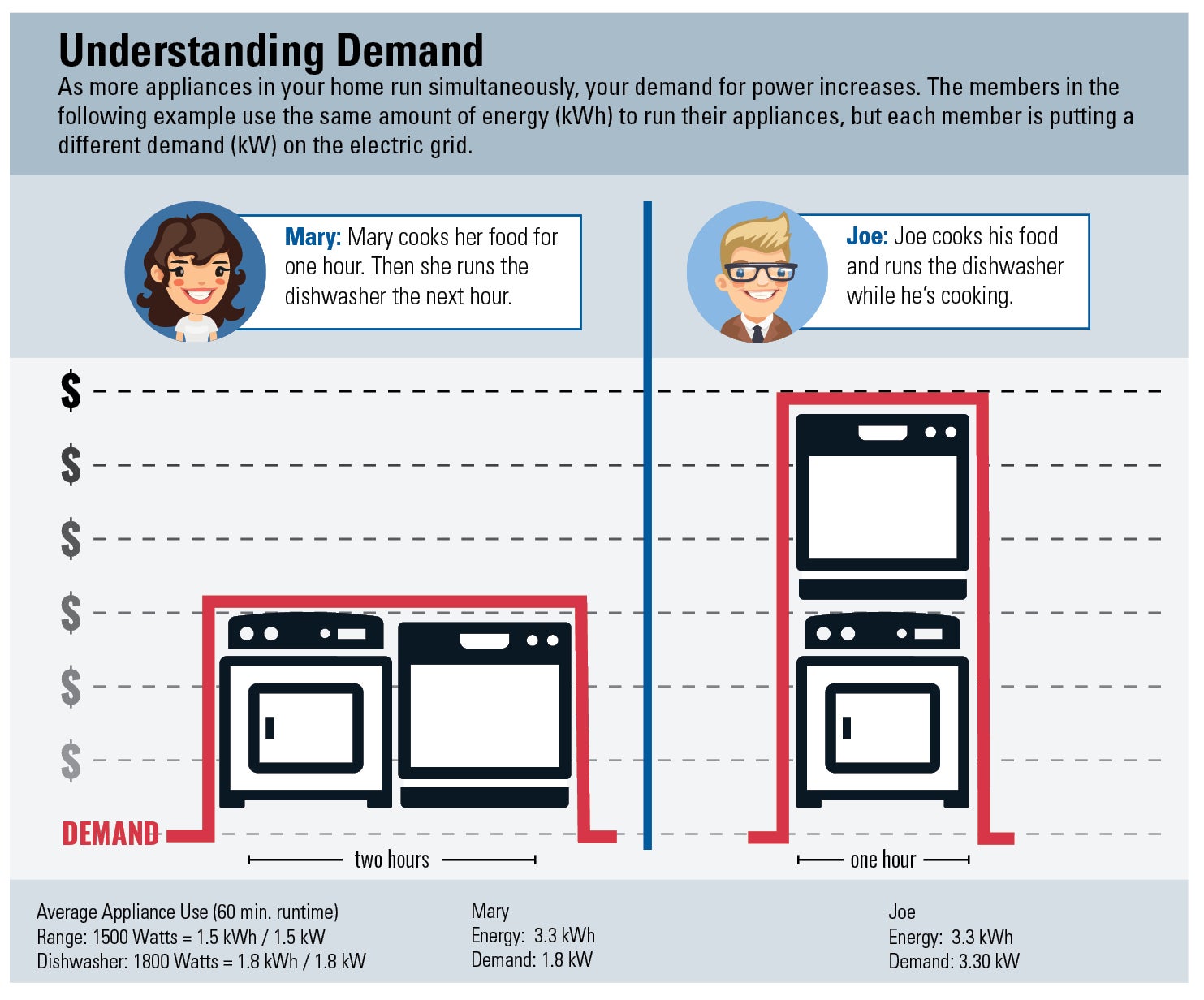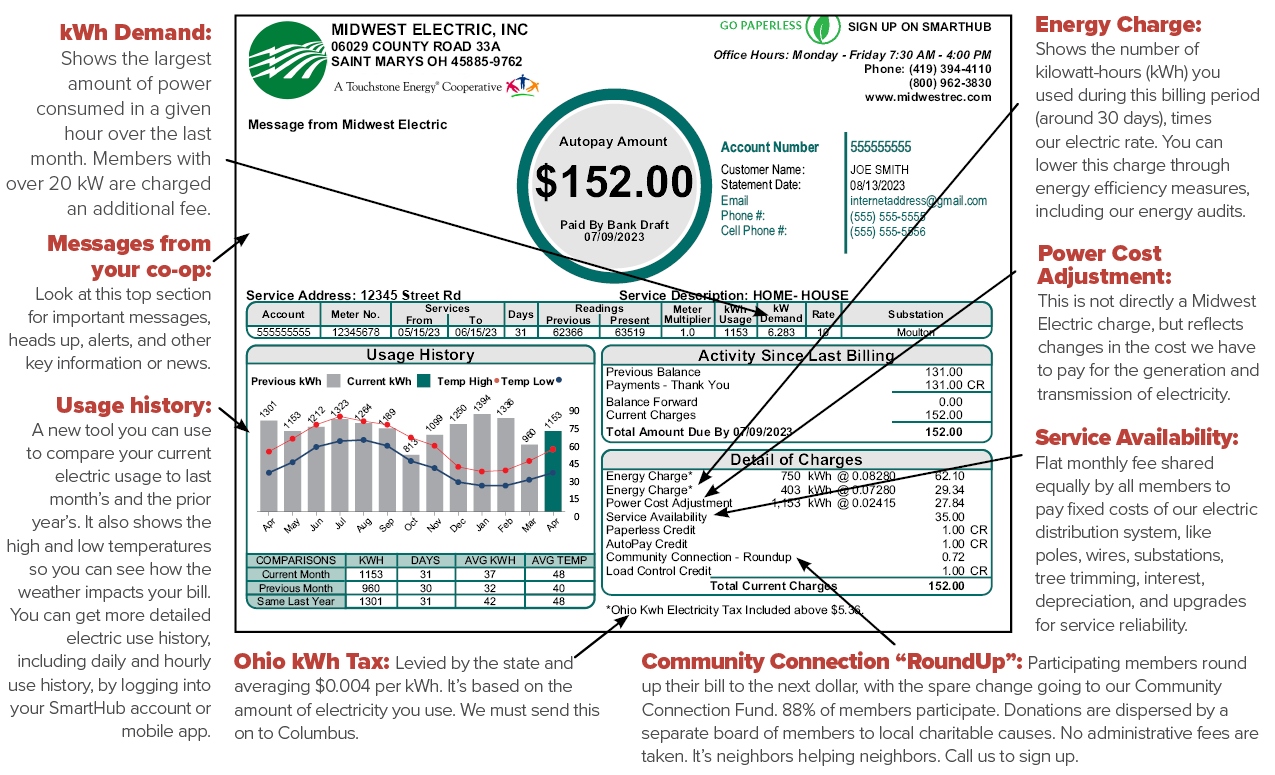Distribution charges are the co-op’s costs to deliver energy to your location.
Monthly Service Availability Charge
This is a flat monthly charge to pay the fixed costs of an electric distribution system, including poles, wires, substations, transformers, meters, tree trimming, pole testing, interest, depreciation, as well as the cost of repairs, maintenance, and upgrades. The Service Availability charge helps pay for electric reliability investments.
Energy Charge
The cost for the minimum delivery system to provide electric service. This shows the number of kilowatt-hours (kWh) you used during this billing period (typically 30 days), times our electric rate. You can lower this charge through energy efficiency measures, including our energy audits.
Why do I have to pay a flat monthly service charge even if I’m not using power?
As a member of Midwest Electric, you make an investment in the co-op every time you pay your bill. This collective investment in the co-op benefits you and the community immediately and over time. We all need a reliable local energy grid, so we all share in the costs of building and maintaining it. This is the cost needed to provide service, divided among our more than 11,000 members.
The flat monthly service charge helps your co-op pay for the operation and maintenance of our overall electric system. This means making YOUR electricity reliable when YOU want it. This cost includes combating cybersecurity threats and building and maintaining poles, substations, and other equipment. All of this takes strategic planning and significant resources. It not only pays for the purchase and installation of that equipment, but the replacement, maintenance, and repair, so you can enjoy power available 99% of the time.
All members pay it to help recover some of the fixed costs of our electric grid, like having the electric facilities available to provide electric service even before the first electron is needed.
Think of the service charge like property taxes.
Property taxes help pay for road construction and maintenance, police and fire protection, and other such services. If you’re away from home for a month, do you get to waive property taxes for that month? No, you still owe property taxes even if you’re not at the property. That’s because the county/township/village still incurred the costs of making those roads and services available.
The service charge is necessary to keep our finances healthy, so we can continue to make investments in our distribution system and ensure power reliability for years to come.
This is not directly a Midwest Electric charge; it reflects changes in the cost we have to pay for the generation and transmission of electricity. This includes the cost of fuels to generate electricity; high voltage transmission to move the electricity from the generating plant to our local substation; and peak demand costs when electric use is high for all members. You can lower this charge through energy efficiency measures, including our energy audits. You can also help us manage this charge by joining our load management program.
Participating Community Connection Fund members opt to “round up” their electric bill to the next highest dollar, with those pennies going to our Community Conncetion trust fund. This spare change is allocated quarterly and donated to local charitable causes such as fire departments, food pantries, libraries, playgrounds, and more. NO administrative fees are taken. A separate board of Midwest members reviews applications and makes fund decisions. It’s truly our “neighbors helping neighbors” co-op philosophy in action.
We also include a snapshot of your electric usage history and the average temperature with each bill so you can compare the current month’s use to the last month and the same month of the year prior. We hope this will help members understand why their bills increased or decreased, as they can analyze what they did differently in their homes each month (and see how weather impacts their bill.).
You can get a more detailed electric use history, including your daily and hourly use history, by logging into your SmartHub account or mobile app.
Learn more about our rates by visiting our Rates and Fees Page.
To account for the cost of meeting demand, Midwest implemented a demand charge to the residential billing structure in September of 2023. Residential members who use more than 20 kWh in one hour (about 5% of members) will receive a $20 charge on their bill. This will not affect your bill if you have normal usage. (The average residential member uses a demand of about 7 kWh.) It may affect those with very high demand from grain dryers, pool heaters, electric vehicle chargers, etc.
The demand charge is determined based on the highest demand recorded every hour. This charge is added to the member’s bill alongside the Service Availability charge — circled in red on the sample bill at left. These charges reflect the cooperative’s costs associated with infrastructure upgrades, capacity planning, and ensuring reliable service during demand periods.
The implementation of residential demand billing encourages members to manage and reduce their demand, leading to more efficient energy consumption patterns. By doing so, customers can effectively control their electricity costs and contribute to the overall stability and efficiency of the cooperative’s electrical system.

You can get a more detailed electric use history, including your daily and hourly use history, by logging into your SmartHub account or mobile app.
Have questions? Call 800-962-3830. Let us help you understand the bill you receive each month.


